More about SDC
PRAY and REFLECT
Other issues
Issue 15: Autumn 2020
Download the pdf version of this issue by clicking here.
The word ‘CATECHIST’ comes from the Greek word meaning ‘to echo’. As Catechists or teachers of RE we do not proclaim our own word. We echo the message of Jesus Christ our Lord. This newsletter aims at providing parish catechists and teachers of RE in schools some support in terms of reflections, ideas, useful resources they can use and so on. Feel free to share with other colleagues and friends. There is also a pdf version which you can download by clicking on the thumbnail below.
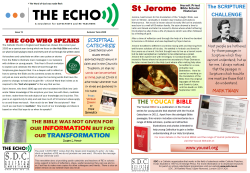
| In this issue |
| The God who Speaks |
| Scriptral Catechesis |
| Quote - Dwight L Moody |
| St Jerome - Hermit, Bible Scholar, Historian |
| The Scripture Challenge |
| Resources - The YouCat Bible |
The God who Speaks

The Catholic Church in England and Wales has chosen this current year 2020 as a special year during which we focus on the Holy Bible and reflect on what is God saying to each and every one of us through his written word.
As teachers and catechists we often use quotes or stories from the Bible to illustrate main messages in our sessions with children or young people. This Year’s Church invitation to explore and celebrate the Word of God through the Scriptures goes beyond that. It is a deeper call to reflect on how to portray the Bible and its contents across to others, not just as mere words printed on paper but as living words that have the power to change, to heal and to give life - a kind of Word that invites us to respond to the "God who speaks" in the way that we live.
Saint Jerome, who lived 1600 ago and who translated the Bible into Latin wrote: Make knowledge of the scripture your love; live with them, meditate on them; make them the sole object of your knowledge and inquiries. This year is an opportunity to stop and ask how much of St Jerome’s ideas apply to us and those we teach. How much do we ‘love’ the scriptures? How much we use them to meditate? How much of our knowledge and ideas is based on what God says to us when he speaks?
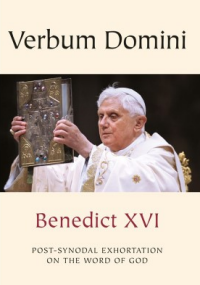
Scriptral Catechesis
Catechetical work always entails approaching Scripture in faith and in the Church’s Tradition, so that its words can be perceived as living, just as Christ is alive today wherever two or three are gathered in his name.
Pope Benedict, Verbum Domini
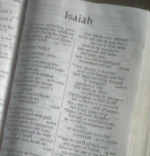
Quote
The Bible was not given for our INFORMATION but for our TRANSFORMATION
Dwight L Moody
St Jerome
Hermit Priest, Bible Scholar, Historian
Jerome, best known for his translation of the ‘Vulagte’ Bible, was born in Stridon, (probably in modern day Croatia) as Eusebius Hieronymus. Not much is known about his early life but he probably was born to a well off Christian family. He soon showed a love to Latin and Greek and later he moved to Rome where while furthering his studies he also chose a life of pleasure which was often followed by a feeling of guilt.

After a time of reflection and through the help of a friend he decided to become a Christian and was baptised by Pope Liberius.
Jerome travelled to different countries mixing with and learning from well known scholars of his day. He settled in Antioch and lived for four years as a hermit. His first thought was to live as a hermit monk but he later accepted an invitation to be ordained as a priest. Jerome then spent time with St Gregory in Constantinople, then moved to Rome where he became the secratary to Pope Damasus. He later moved back to the Holy Land where after visiting holy sites he settled in a cave, probably near Bethlehem. Here he carried on working on the translation of the Bible from the original laguages of Hebrew and Greek to Latin, until his death on 30th September 420.
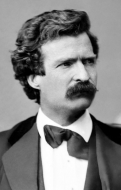
The Scripture Challenge
Most people are bothered by those passages in Scripture which they cannot understand; but as for me, I always noticed that the passages in Scripture which trouble me most are those that I do understand.
Mark Twain

Online Resources
YouCat Bible
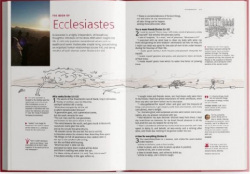
The YouCat BIBLE is a publication in the YouCat series for young adults that started with the YouCat Catechism in 2011. Apart from the abridged Bible passages, this version includes commentaries by a range of Bible scholars, quotes and attractive illustrations and photos intended to help young Catholics to gain a better understanding of our Holy Scriptures.
For more details on the YouCat BIBLE and the range of YouCat publications, visit the Youcat Website at:
www.youcat.org
Download the pdf version of this issue by clicking here.

Follow us on